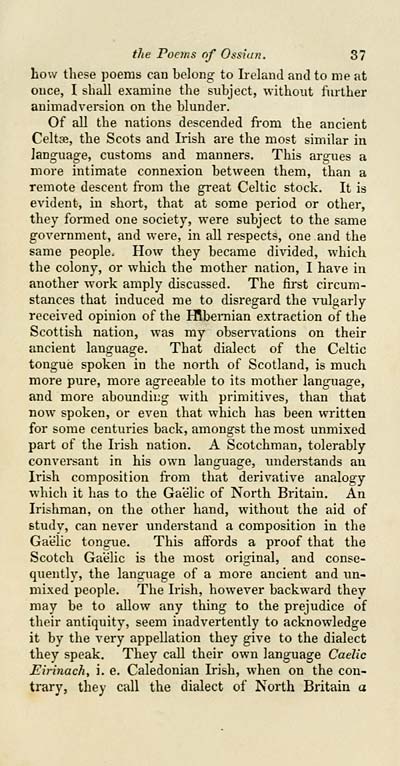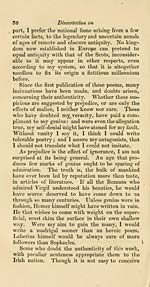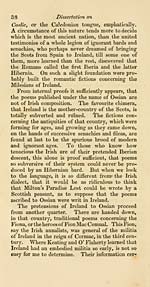Ossian Collection > Poems of Ossian
(45)
Download files
Complete book:
Individual page:
Thumbnail gallery: Grid view | List view

the Poems nf Ossian. 37
how these poems can belong to Ireland and to me at
once, I shall examine the subject, without further
animadversion on the blunder.
Of all the nations descended from the ancient
Celtse, the Scots and Irish are the most similar in
language, customs and manners. This argues a
more intimate connexion between them, than a
remote descent from the great Celtic stock. It is
evident, in short, that at some period or other,
they formed one society, were subject to the same
goveniment, and were, in all respects, one and the
same people. How they became di^dded, which
the colony, or which the mother nation, I have in
another work amply discussed. The first circum-
stances that induced me to disregard the vulgarly
received opinion of the Hibernian extraction of the
Scottish nation, was my observations on their
ancient language. That dialect of the Celtic
tongue spoken in the north of Scotland, is much
more pure, more agreeable to its mother language,
and more aboundii^g with primitives, than that
now spoken, or even that which has been written
for some centuries back, amongst the most unmixed
part of the Irish nation. A Scotchman, tolerably
conversant in his own language, understands an
Irish composition from that derivative analogy
which it has to the Gaelic of North Britain. An
Irishman, on the other hand, without the aid of
study, can never understand a composition in the
Gaelic tongue. This affords a proof that the
Scotch Gaelic is the most original, and conse-
quently, the language of a more ancient and un-
mixed people. The Irish, however backward they
may be to allow any thing to the prejudice of
their antiquity, seem inadvertently to acknowledge
it by the very appellation they give to the dialect
they speak. They call their own language Gaelic
Eirinach, i. e. Caledonian Irish, when on the con-
trary, they call the dialect of North Britain a
how these poems can belong to Ireland and to me at
once, I shall examine the subject, without further
animadversion on the blunder.
Of all the nations descended from the ancient
Celtse, the Scots and Irish are the most similar in
language, customs and manners. This argues a
more intimate connexion between them, than a
remote descent from the great Celtic stock. It is
evident, in short, that at some period or other,
they formed one society, were subject to the same
goveniment, and were, in all respects, one and the
same people. How they became di^dded, which
the colony, or which the mother nation, I have in
another work amply discussed. The first circum-
stances that induced me to disregard the vulgarly
received opinion of the Hibernian extraction of the
Scottish nation, was my observations on their
ancient language. That dialect of the Celtic
tongue spoken in the north of Scotland, is much
more pure, more agreeable to its mother language,
and more aboundii^g with primitives, than that
now spoken, or even that which has been written
for some centuries back, amongst the most unmixed
part of the Irish nation. A Scotchman, tolerably
conversant in his own language, understands an
Irish composition from that derivative analogy
which it has to the Gaelic of North Britain. An
Irishman, on the other hand, without the aid of
study, can never understand a composition in the
Gaelic tongue. This affords a proof that the
Scotch Gaelic is the most original, and conse-
quently, the language of a more ancient and un-
mixed people. The Irish, however backward they
may be to allow any thing to the prejudice of
their antiquity, seem inadvertently to acknowledge
it by the very appellation they give to the dialect
they speak. They call their own language Gaelic
Eirinach, i. e. Caledonian Irish, when on the con-
trary, they call the dialect of North Britain a
Set display mode to: Large image | Transcription
Images and transcriptions on this page, including medium image downloads, may be used under the Creative Commons Attribution 4.0 International Licence unless otherwise stated. ![]()
| Early Gaelic Book Collections > Ossian Collection > Poems of Ossian > (45) |
|---|
| Permanent URL | https://digital.nls.uk/77741289 |
|---|
| Description | Selected books from the Ossian Collection of 327 volumes, originally assembled by J. Norman Methven of Perth. Different editions and translations of James MacPherson's epic poem 'Ossian', some with a map of the 'Kingdom of Connor'. Also secondary material relating to Ossianic poetry and the Ossian controversy. |
|---|
| Description | Selected items from five 'Special and Named Printed Collections'. Includes books in Gaelic and other Celtic languages, works about the Gaels, their languages, literature, culture and history. |
|---|

